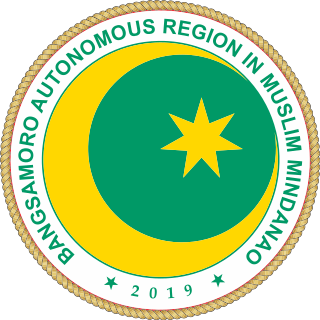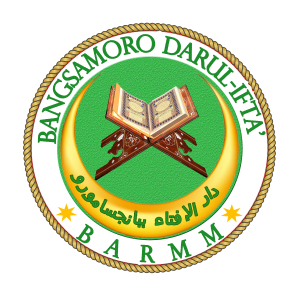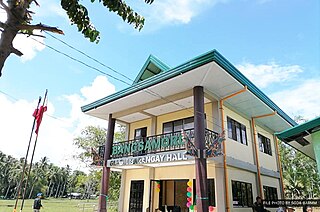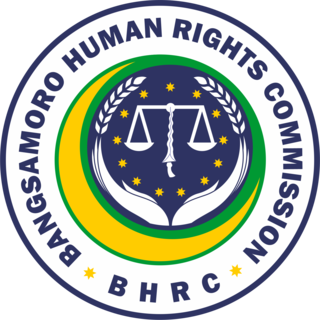
In the Philippines, regions are administrative divisions that primarily serve to coordinate planning and organize national government services across multiple local government units (LGUs). Most national government offices provide services through their regional branches instead of having direct provincial or city offices. Regional offices are usually but not necessarily located in the city designated as the regional center.

The Autonomous Region in Muslim Mindanao was an autonomous region of the Philippines, located in the Mindanao island group of the Philippines, that consisted of five predominantly Muslim provinces: Basilan, Lanao del Sur, Maguindanao, Sulu, and Tawi-Tawi. It was the only region that had its own government. The region's de facto seat of government was Cotabato City, although this self-governing city was outside its jurisdiction.

Bangsamoro, officially the Bangsamoro Autonomous Region in Muslim Mindanao, is an autonomous region in the Philippines, located in the southwestern portion of the island of Mindanao.

The Bangsamoro Parliament is the legislature of Bangsamoro, an autonomous region of the Philippines. It is currently led by the Bangsamoro Transition Authority, an interim regional governing body. The inaugural session of the parliament took place on March 29, 2019, while its first regular session is projected to take place in 2025.

The Bangsamoro Organic Law, also known as the Bangsamoro Basic Law (BBL), and officially designated as Republic Act No. 11054, is a Philippine law that provided for the establishment of the Bangsamoro Autonomous Region in Muslim Mindanao (BARMM).

An autonomous region of the Philippines is a first-level administrative division that has the authority to control a region's culture and economy. The Constitution of the Philippines allows for two autonomous regions: in the Cordilleras and in Muslim Mindanao. Currently, Bangsamoro, which largely consists of the Muslim-majority areas of Mindanao, is the only autonomous region in the country.

The 2019 Bangsamoro autonomy plebiscite was a two-part plebiscite held in Mindanao, Philippines, that ratified the Bangsamoro Organic Law (BOL) and replaced the Autonomous Region in Muslim Mindanao (ARMM) with the Bangsamoro Autonomous Region in Muslim Mindanao (BARMM), as well as the scope of the said region.
The Bangsamoro Transition Authority is the interim regional government of the Bangsamoro Autonomous Region of the Philippines and has executive and legislative powers over the region.

The chief minister of Bangsamoro is the executive head of the Bangsamoro Autonomous Region in Muslim Mindanao, an autonomous region within the Philippines.

The Bangsamoro Darul Ifta' (BDI-BARMM) is an Islamic advisory council which has jurisdiction over the Bangsamoro Autonomous Region in Muslim Mindanao.

The Special Geographic Area (SGA) is a loose collection of 63 barangays in six municipalities of the province of Cotabato in the Philippines. It is part of the Bangsamoro Autonomous Region in Muslim Mindanao, despite the province of Cotabato itself being part of a separate neighboring region, Soccsksargen.

The Ministry of Indigenous Peoples' Affairs (MIPA), is the regional executive department of the Bangsamoro Autonomous Region in Muslim Mindanao (BARMM) responsible for affairs relating to non-Muslim indigenous people in the region.

The transition period of the now-defunct Autonomous Region in Muslim Mindanao (ARMM) into the Bangsamoro Autonomous Region in Muslim Mindanao (BARMM) began when the Bangsamoro Organic Law was ratified in a two-part plebiscite held in January and February 2019. It is set to end after the first set of regular officials are elected in 2025.

The flag of Bangsamoro is the flag which represents the Bangsamoro Autonomous Region in Muslim Mindanao, an autonomous region of the Philippines.

The Emblem of Bangsamoro is the official insignia of the Bangsamoro Autonomous Region in Muslim Mindanao, an autonomous region in the Philippines.
1BANGSA is shortened word of non-profit organization in the Philippines known as One Bangsamoro Movement, Inc., a group of multi-sectoral leaders and activists in the Philippines advocating peace and unity among Filipinos as well as Bangsamoro people. It was led by Maulana “Alan” A. Balangi, a Maranao.
Laisa Masuhud Alamia is a Filipino politician and lawyer who is a member of the interim Bangsamoro Parliament. She is also the Minority Leader of the regional parliament.

The speaker of the Bangsamoro Parliament is the presiding officer of the Bangsamoro Parliament, the regional legislature of Bangsamoro Autonomous Region in Muslim Mindanao (BARMM) of the Philippines.

The Bangsamoro Human Rights Commission is a government agency on human rights with jurisdiction over the Bangsamoro Autonomous Region in Muslim Mindanao (BARMM) in the Philippines.

The Bangsamoro Sports Commission (BSC) is a regional government agency which tackles affairs related to sports in the Bangsamoro Autonomous Region in Muslim Mindanao (BARMM) of the Philippines.














